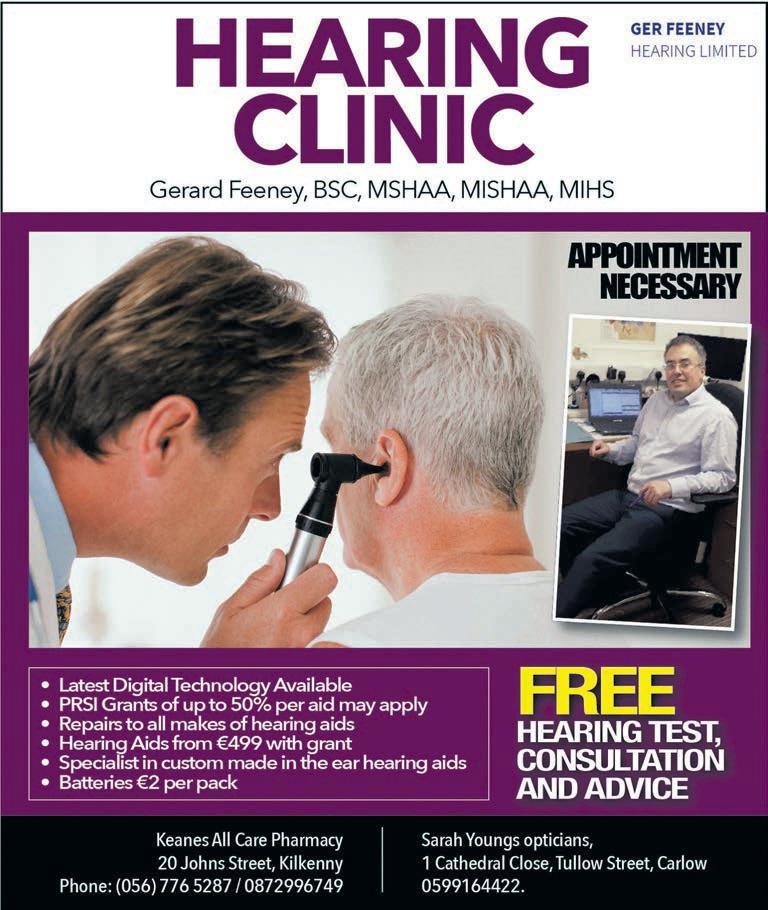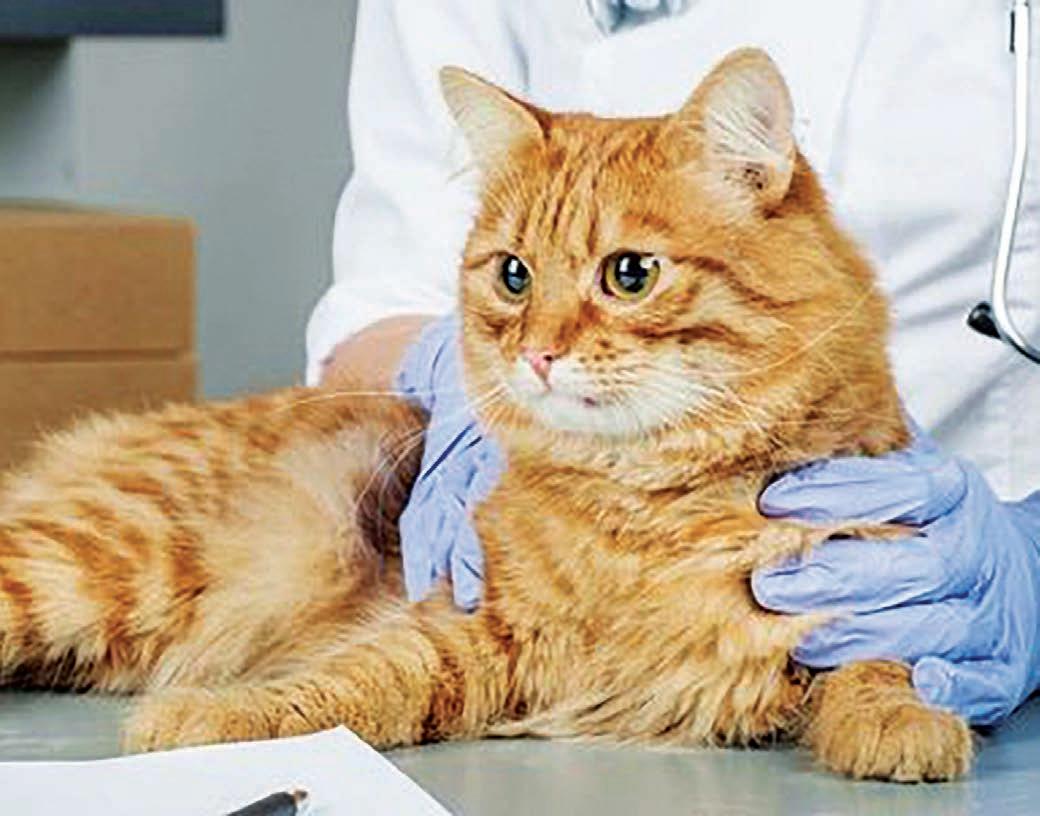
13 minute read
Paul Hopkins
The Fact OfThe Matter

Advertisement

PAUL HOPKINS PAUL HOPKINS
Women fare worse in time of coronavirus
ONE could be forgiven for thinking that, while all eyes are on Afghanistan and the plight of its women, all is well with the world and women elsewhere.
If only it were so. Eighteen months on the Covid crisis has led to a decline in living standards for girls and women around the world, according to global watchdogs. With access to school sporadically disrupted, massive job losses, domestic violence, increasing incidents of rape and teenage pregnancy, the situation is now critical on a scale matched only by the pandemic itself.
When one considers that 70% of global health workers are women, that, too, exacerbates their lot.
Health, however, is not the only sector where women are overrepresented: according to a UN Policy Brief up to 60% of women work in the informal economy, making them considerably more vulnerable to the crisis. School closures, too, and the increasing needs of the elderly have, no surprise here, led to women spending more time doing unpaid work.
A report by Deloitte Global, which surveyed 5,000 women in 10 countries, nds 80% of women saying their workloads have increased because of the pandemic, while 66% report having more responsibilities at home. e common stereotype is thus being reinforced. Gender inequality is on the rise due to the crisis, says the UN. According to one brief, women are almost twice more likely than men to have lost their jobs during the pandemic, while according to an EU report, women are “forced into precarious jobs” because they can’t get a ordable childcare.
Girls’ access to education, one of the biggest considerations in gender equality, is also on the decline, as I wrote some weeks back. In 2020, up to 11 million girls worldwide were unable to attend school. is return to the household for women and girls is concerning, says the UN.
For woman, the pandemic has created a sharp increase in domestic violence and sexual abuse, globally, according to Amnesty International which cites copious examples from Africa to the Americas.
In Ireland we cannot a ord to be complacent. Women in business here have taken on more of the burden of family care, according to one survey, raising concern that the Covid19 crisis could reverse progress towards equality at work. e research for Ibec, the business lobby group, suggests the coronavirus has had a deep impact on the working lives of many women, sharpening inequalities that were already there before the coming of the rogue microbe.
One in ve companies of 270 surveyed reported a change in the position of women in the past 18 months, with employers citing increased pressure on female workers and more childcare responsibilities. Which prompts the question, where is that village that rears a child?
Women here had more early starts, late nishes and sought more time o to look after children and elderly relations.
“Historically women are disproportionately impacted by crises, disasters and societal disruption, and Covid-19 checks all those boxes,” says Dr Kara McGann, head of social policy with Ibec. “Our ndings con rm that Covid-19 has accentuated long-standing gender imbalances across several dimensions, threatening hard-won markers of gender equity.”
Almost half of the Ibec respondents – 48% – said more women than men had asked changes to their working patterns to facilitate ‘other’ responsibilities. Only 3% said more men than women had made the same request. In addition, one in three respondents said that more females than males had asked for unpaid leave to facilitate caring responsibilities. Again, only 3% said more men than women sought such leave.
Meanwhile research at Maynooth University found that one in 10 women has quit work because of the pressures of juggling a job with pandemic home life. And that in almost two thirds of families, the mother took the full responsibility with any homeschooling.
And, yes, it is not just the pandemic that’s to blame.
Even before Covid, Oxfam found that women in Ireland did 38 million hours of unpaid work every single week, domestic chores and care work that enabled others to go out into paid employment.
Now consider this. If such women received a living wage for this invisible work it would cost the State €24bn a year.
It seems all that was still wrong in Irish society before Covid has been exacerbated during the lockdowns and the only way we can learn anything is to refocus our watch on society-changing economic and social issues as we struggle to come out of it all...



Two out of three are now more eco conscious
TWO out of three Irish people are more eco conscious than thy were before the pandemic according to research from the environmental organisation, Repak.
We Irish are developing new habits with 64% of people saying they are more eco conscious now than before the pandemic and 89% con dent that their recycling habits are good. e research of 850 adults examined the public’s attitudes towards eco-conscious behaviour after it was recently announced that all plastic packaging waste can now go into the recycling bin. In
Make Way Day aims to make a di erence
EVERY corner of Ireland will be put to the test for basic access issues this Friday, September 24 when the Make Way Day campaign returns, with a testing twist! e campaign organisers the Disability Federation of Ireland, DFI, have developed an online test that campaigners can use to test and rate their local area or 5k.
Cathaoirleach of Kilkenny County Council Fidelis Doherty said: “Make Way Day focuses on individual responsibility, on looking at what we can all do immediately to help our fellow citizens get from A to B, which is a basic right. We in Kilkenny County Council are happy to work with DFI and support the roll-out of Make Way Day across Kilkenny City and county.”
Groups of people with disabilities, their allies, and Kilkenny Access Group will take part. Make Way Day 21 will highlight everyday barriers on our streets that negatively a ect active civic participation of the people of Kilkenny and its visitors.
Kilkenny resident Aidan J.Brennan, a wheelchair user and disabled driver, said: “Drivers, including commercial vehicles, should not use the disabled parking bays with the usual excuse of ‘I’ll only be there for a second’. ose of us with a limiting disability don’t have it for a second or minute but most often a lifetime.
“Also, dog users, be mindful of leaving your dog’s waste on the street where those with mobility issues cannot avoid it and it has to be cleaned o their wheels or walking aids.” e backbone of this campaign is people with disabilities. is online test empowers them to survey their area for obstacles and rate its accessibility. It will once again give them the chance to share their frustrations by posting photos of obstacles to social platforms with the hashtag, #MakeWayDay21 e test will be available at www.makewayday. com and from partner local authorities such as Kilkenny County Council at www. kilkennycoco.ie. It is easy to use and download to a phone and will be circulated widely on the campaign’s social media platforms. e collective aim is to have all the 5ks or neighbourhoods join up, to give a comprehensive map of access in Ireland. All the results will be co-ordinated, aiming to feed them back to the right people and work together towards creating clearer streets and a more accessible environment.
Jobs for disabled lowest in EU
IRISH people with disabilities have one of the lowest employment rates in the EU, a study published today shows.
New research by the Economic and Social Research Institute reveals they had the fourth-lowest employment rate at only 36% of those of working age with disabilities among EU countries in 2018.
Two years earlier, only a third of working age people with disabilities said they were employed, compared with two thirds of those without disabilities. e report nds substantial variation between those with di erent disabilities who are at work.
Only 15% of those with an intellectual disability were working in 2016, compared with 34% of those with blindness or a serious vision impairment. Ireland, we are bow exceeding the EU plastic recycling targets of 22.5%. However, achieving the ambitious targets for plastics recycling of 50% by 2025 and 55% by 2030, under the Circular Economy and EU Legislation, will require a concentrated e ort by all stakeholders. Putting all plastics in the recycling bin is a step towards making this target achievable.
Repak created its Team Green initiative in 2018 to support Ireland in achieving future packaging recycling targets set by the EU. To date, more than 22,000 individuals have joined Repak Team Green with recycled plastic packaging tonnes increased by 9% between the start of 2019 and the end of 2020.
CEO of Repak, Séamus Clancy said: “All plastic packaging waste now being accepted into recycling bins is a very positive change as, not only does it eliminate confusion among householders about what can be recycled, it’s also an opportunity to drive a signi cant increase in our recycling rates.”
You can join Repak Team Green at repak.ie/ teamgreen.

‘Reject’ moves to harm animal welfare
MEPs from Ireland must reject the motion before the European Parliament that would limit the use of animal medicines, according to IFA Animal Health Chairman Pat Farrell.
“If the motion is accepted, it could be very damaging for animal health. Farmers are responsible users of medicines to treat animal bacterial diseases. Restricting them could jeopardise food safety and food security,” he said.
The motion objects to the Delegated Act on the use of antimicrobial resistance.
Mr Farrell said there were some instances where the use of critical antibiotics was essential as there wasn’t an alternative. “Without these medicines, the livelihoods of farmers will be threatened because they cannot treat their animals,” he said.
The Animal Health Chairman said the strict controls around the use of animal medicines should be a sufficient safeguard, without imposing further unreasonable restrictions.
IFA has been in contact with MEPs ahead of the vote, pointing out that antibiotics are only allowed with a prescription and only following physical examination, good husbandry and proper diagnosis.
“We have also reminded MEPs that there is robust scientific backing from a range of agencies, including public health experts. Our position has always been that legislators should be guided by science,” he said.
Approval under way for Tranche
IFA Rural Development Chairman Michael Biggins has welcomed the announcement by the Minister for Agriculture Charlie McConalogue that approval has started for quali ed applications received by the department under Tranche 22. e review of the reference costings for grant-aided work under TAMS was carried out by the department in March and was based on analysis of the costs of completed works up to the end of March. e review is being implemented from the opening of Tranche 23, which began on July 24 last. e Rural Development Chairman said: “All Tranche 22 applicants must be o ered the revised reference costing rates. Not to do so will put them at a substantial nancial disadvantage”.
“Materials such as steel, timber and concrete have seen steep increases this year.
“ e impact of a costings increase means that a farmer will get a more realistic rate of grant relative to actual investment costs incurred,” he said.
To keep pace with continuing rising costs, this review must be ongoing and ready to be updated for the opening of Tranche 24, which is due to open on November 6.
“I’m calling on the Minister of Agriculture to ensure all applicants in Tranche 22 get the opportunity to retrospectively avail of the revised costings.
“He must also ensure that the costings are reviewed again for Tranche 24 to keep pace with current price in ation,” he said. is year, to date, €43.4 million has now been paid in respect of completed investments, according to the Department of Agriculture.
Candida what’s it’s all about?
CLAIR WHITTY
CANDIDIASIS is a fungal infection caused by a yeast called Candida. We all have this organism and for most of us it doesn’t cause any problems. It’s normally kept in check with our own friendly gut bacteria. It can be triggered by exhaustion, low stomach acid, impaired immunity, contraceptive pill, HRT, and antibiotics. Or caused by poor diet, one that is high in sugar, or where there is excess alcohol.
Symptoms you may experience: Aches, and pain, allergies, or skin problems. Anxiety, low mood, or depression. Bloating, or digestive disorders. Concentration, memory problems or foggy brain. Low energy, stress, and irritability. Depressed immunity, recurring urinary infections, oral or vaginal thrush. You may have one or several of these symptoms.
You’ll need to do a number of things to treat Candida. Step one involves starving the organism of food, the yeast loves sugar and will ourish in an environment rich in these foods. You’ll need to avoid totally all sugars including fruit. Foods that contain yeast include breads, cakes, baked good, processed foods, yeast can also be found on the outside of hairy fruits and some nuts. Cheese, vinegar, and alcohol should be avoided too. It’s a tough diet, but you won’t have to follow it forever, once you get it under control, you’ll be able to relax about it all.
Next, you’ll need to support your gut to heal it and kill o the organism using antifungal herbs and digestive supporting nutrients. New Nordic Dida is a supplement that our customers use for gastrointestinal support and have great success with when used with the appropriate diet and lifestyle changes. You’ll need to support your friendly gut bacteria so top up with friendly microbiotics like Udo’s Choice Super 8.
Ideally, you’ll need a good strong immune system too. A healthy diet and the reduction of sugar will help here. Include immune supporting herbs like Echinacea, or Vitamin D.
So, to recap, you’ll need to avoid sugar and yeast, support gut health, kill o the organism, and support immunity. Consider the underlying cause as this will have to be addressed too.
For more advice and information on how you can deal with Candida why not pop in to see us, give us a call, or email us. Natural Health Store, Market Cross Shopping Centre Phone: O56 7764538 Email: info@naturalhealthstore.ie Visit our online shop www. naturalhealthstore.ie

The Orchard Salon & Day Spa @ Hotel Kilkenny

NESTLED in the lush grounds of Hotel Kilkenny, our Spa provides a calm and relaxing space to enjoy top quality treatments & Massage.
Passionate about our luxurious Image & Yonka products, our experienced therapists will ensure your treatments leave you feeling nothing less than pampered.
O ering a host of Skin Specific Facials, Massage with Deep Tissue optional and Beauty Specials for Nails, Tans and Group Events, we will cater our treatment options to your speci c needs. ty to catch up with friends after the school run. Take back your mornings, enjoying an hours treatment each, followed by exclusive access to our Relaxation Room with an Ultimate Co ee Morning Platter. is very popular Package can be booked for any morning of the week and for up to 6 people.
BRIDAL PARTIES
We love our Brides and our Bridal Parties are a Spa speciality! Let us pamper you all whilst you enjoy exclusive access to our Relaxation Room for last minute catch ups before the big day. Our Tan & Shellac Specials are particularly popular and we also o er a Skin Consultation to all our Brides. is will ensure your skin is at its very best on your Wedding Day.
COUPLES
Our Couples Massage is the perfect gift for your loved one and our Relaxing Couples Package will ensure you both leave the Spa feeling your very best.
SPA REWARDS
We appreciate our Clients and o er a rewards system to gift you a free Massage on your 6th visit to the Spa and all our clients enjoy our free parking!





